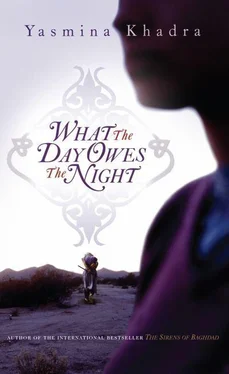Often, after lunch, I would sit in the rocking chair on the veranda for half an hour so I could gaze out over the dappled greens of the plains, the ravines of ochre clay and the many-coloured mirages rising in the distance. The view was almost otherworldly in its serenity. I would gaze out across the fields and doze. Sometimes Germaine would find me, head thrown back, mouth open, and would tiptoe away so as not to wake me.
Río Salado was waiting expectantly for summer. We knew time was on our side, that soon the beaches and the grape harvest would breathe new life into us the better to enjoy the feasting and the riotous bacchanalia. Already summer loves blossomed in the idle hours like flowers in the sunlight. Girls strolled down the main street, dazzling in their summer dresses, flaunting bare arms or a flash of tanned shoulder. The boys on the café terraces were wont to fly into a rage if someone began delving into their secret sighs and fantasies.
But the very things that made some hearts beat faster becalmed others. Jean-Christophe and Isabelle broke up. The whole village gossiped about their turbulent relationship. I watched as my friend shrivelled. Usually Jean-Christophe was always quick to call attention to himself; he loved to shout to people across the street, to stop traffic, to yell to a barman for a beer. He had always been self-centred and self-seeking, proud to be the centre of his own universe. Now he could not bring himself to look people in the eye, pretended not to hear when some called to him from across the road. He could be tortured by an innocent smile and would analyse the least comment for some malicious implication. He became quick-tempered, distant, and half mad with heartache. I was worried about him. One evening, having spent the day roaming the hills far from wagging tongues, he went to André’s diner, and after knocking back several bottles, was so drunk he could barely stand. José offered to give him a lift home, but Jean-Christophe punched him in the face, then picked up an iron bar and drove the rest of the customers out of the diner. Alone amidst the empty benches and tables, he clambered up on to the bar and, reeling and staggering, his nose streaming with blood, pissed copiously over the flower beds, roaring that he would do the same to the bastards talking about him behind his back. It took considerable skill to steal up on him, take the iron bar, tie him up and carry him home on a makeshift stretcher. The incident provoked a howl of indignation in Río Salado. They had never seen the like of it. This was hchouma – mortal shame – something no Algerian village could forgive. Anyone might stumble, fall and pick themselves up again, but having sunk so low, a man lost the respect of others and often their friendship. Jean-Christophe knew that he had overstepped the mark, and knew that he could not show his face in the village again. He set off for Oran, where he spent his days wandering aimlessly from bar to bar.
Simon, for his part, was pragmatic. He took his fate in his own hands. He had long been tired of being a factotum, frittering his life away in an office that smelled of mildew and interminable lawsuits. It was a job ill-suited to his sense of himself as the life and soul of the party. He had neither the temperament nor the forbearance for a career as a badly paid pen-pusher. The office walls were closing in; his world was reduced to a sheet of yellow paper. He was suffocating, waiting like a dumb animal for a bell to tell him he could go home. Worst of all, he realised, the worries and anxieties of his job were the only things that still reminded him that he was human. One morning after a blazing row with his boss he resigned, determined to set himself up in business and be his own boss.
I barely saw him any more.
Fabrice, too, had less and less time to spend with me, but I understood. His relationship with Émilie seemed serious. They met every day behind the church, and on Sundays I could see them from my balcony walking through the vineyards, or heading out of the village on their bicycles, his shirt billowing, her hair whipped back by the wind. It was a joy to watch them ride up the hill, out of the village, away from the gossips. Sometimes, in my mind, I would go with them.
Then, one morning, a miracle occurred. I was stocking the shelves in the pharmacy when I saw my uncle slowly come down the stairs in his dressing gown, cross the room and go outside. Germaine, who was two steps behind him, could hardly believe her eyes. My uncle had not set foot outside the house for years. That morning he stood on the steps of the shop, hands in the pockets of his dressing gown, looking around him, his gaze lingering on the orange groves and then flitting towards the distant hills on the horizon.
‘It’s a beautiful day,’ he said, grinning, and so unaccustomed was he to smiling, I thought his lips might crack. Germaine and I watched as laughter lines spread across his face like the ripples from a pebble in a pond.
‘Would you like me to bring out a chair?’ Germaine asked with tears in her eyes.
‘What for?’
‘You can sit in the sun. I’ll set it next to the window with a little table and make some fresh mint tea and you can watch the people go past.’
‘No.’ My uncle shook his head. ‘No chair today. I think I’ll take a little walk.’
‘In your dressing gown?’
‘If it were up to me, I’d walk around naked,’ said my uncle, and he stepped off the porch.
A prophet walking on water would not have amazed us any more than the sight of my uncle stepping into the street, hands in his pockets, his back straight, walking with a slow, almost military gait. He headed towards a little orange grove and wandered among the trees. Then, catching sight of a partridge taking to the wing, he turned and, following the bird’s flight, disappeared into the vineyards. Germaine and I sat on the veranda, holding each other’s hand, until he came back.
A few weeks later, we bought a second-hand car. Germaine’s nephew Bertrand – now a mechanic – delivered it in person. It was a tiny bottle-green car with hard seats and curved bodywork like a tortoise’s shell. The steering wheel was so big it looked like it belonged in a truck. Bertrand told Germaine and me to climb in and he would put the engine through its paces. It felt like being in a tank. In time, everyone in Río Salado learned to recognise our car a mile off. Hearing the deafening roar of the engine, someone would shout: ‘Attention, here comes the artillery!’ and people would stand on the kerb and salute as we passed.
André offered to give me driving lessons. He took me out to a patch of waste ground, and every time I made a mistake he called me all the names under the sun. Once or twice I was so panicked by his swearing I nearly killed us both. As soon as he had taught me to drive around a tree without grazing it, and do a hill start without stalling, he went back to working at his diner, relieved to have come through the ordeal without a scratch.
One Sunday, after mass. Simon suggested we go down to the beach. He had had a tough week and needed some fresh air. Deciding to head for the port of Bouzedjar, we set off after lunch.
‘Where did you buy that rust bucket? Army surplus?’
‘Okay, maybe it doesn’t look like much, but it gets me where I want to go, and so far it’s never broken down.’
‘I’m surprised you’re not deaf . . . it’s like listening to a steamboat on its last legs.’
‘You get used to it.’
Rolling the window down, Simon stuck his head out, and as his hair was swept back by the wind, I noticed he was already going bald. Seeing my friend suddenly looking older, I glanced in the mirror to see if I did too. We drove through Lourmel and headed straight for the coast. Now and then, when the road crested the peak of a hill, it seemed as though we could almost touch the sky. It was a beautiful late-April morning; the sky was an immaculate blue, the horizon majestic and all around was a feeling of completeness. The last days of spring in Río Salado were often the most splendid. The orange groves thrummed with the sound of early cicadas, and clouds of gnats glittered over stagnant pools like fistfuls of gold dust. If it were not for the squalid shacks scattered here and there, you would have thought you were in paradise.
Читать дальше












